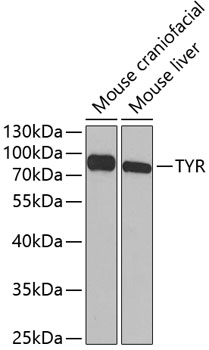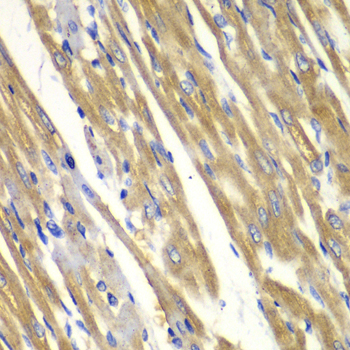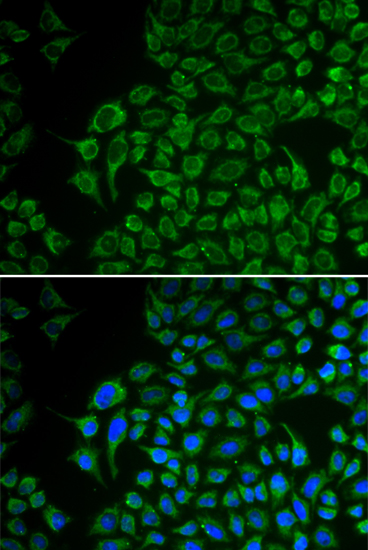-
Product Name
TYR Polyclonal Antibody
- Documents
-
Description
Polyclonal antibody to TYR
-
Tested applications
WB, IHC, IF
-
Species reactivity
Human, Mouse, Rat
-
Alternative names
TYR antibody; ATN antibody; CMM8 antibody; OCA1 antibody; OCA1A antibody; OCAIA antibody; SHEP3 antibody; tyrosinase antibody
-
Isotype
Rabbit IgG
-
Preparation
Antigen: Recombinant fusion protein containing a sequence corresponding to amino acids 20-340 of human TYR (NP_000363.1).
-
Clonality
Polyclonal
-
Formulation
PBS with 0.02% sodium azide, 50% glycerol, pH7.3.
-
Storage instructions
Store at -20℃. Avoid freeze / thaw cycles.
-
Applications
WB 1:500 - 1:2000
IHC 1:50 - 1:200
IF 1:50 - 1:200 -
Validations

Western blot - TYR Polyclonal Antibody
Western blot analysis of extracts of various cell lines, using TYR antibody at 1:1000 dilution.Secondary antibody: HRP Goat Anti-Rabbit IgG (H+L) at 1:10000 dilution.Lysates/proteins: 25ug per lane.Blocking buffer: 3% nonfat dry milk in TBST.

Immunohistochemistry - TYR Polyclonal Antibody
Immunohistochemistry of paraffin-embedded rat heart using TYR antibody at dilution of 1:100 (40x lens).

Immunofluorescence - TYR Polyclonal Antibody
Immunofluorescence analysis of U2OS cells using TYR antibody . Blue: DAPI for nuclear staining.
-
Background
This is a copper-containing oxidase that functions in the formation of pigments such as melanins and other polyphenolic compounds. Catalyzes the initial and rate limiting step in the cascade of reactions leading to melanin production from tyrosine. In addition to hydroxylating tyrosine to DOPA (3,4-dihydroxyphenylalanine), also catalyzes the oxidation of DOPA to DOPA-quinone, and possibly the oxidation of DHI (5,6-dihydroxyindole) to indole-5,6 quinone.
Related Products / Services
Please note: All products are "FOR RESEARCH USE ONLY AND ARE NOT INTENDED FOR DIAGNOSTIC OR THERAPEUTIC USE"
